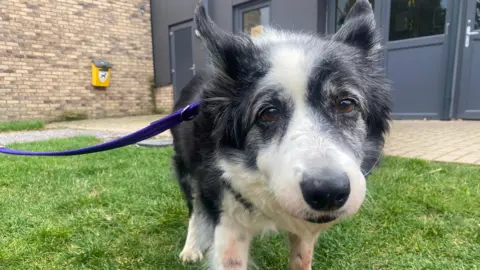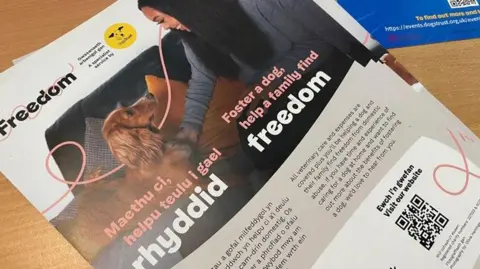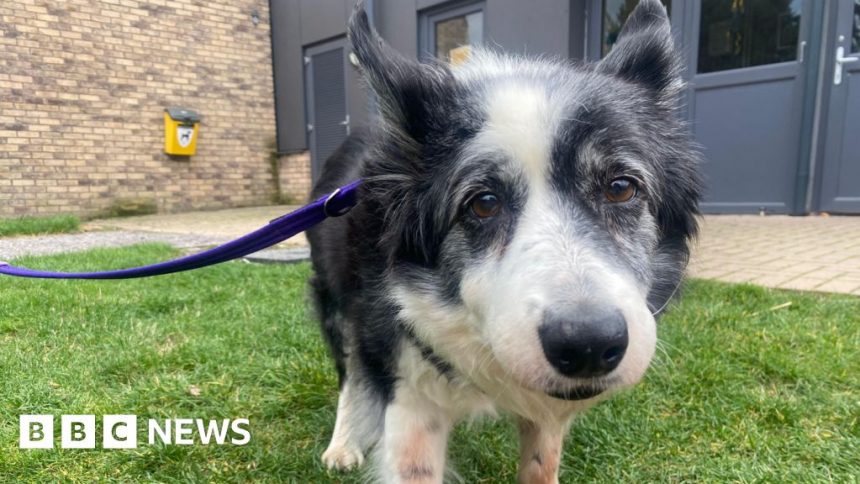How do you flee domestic abuse if you have pets?
 BBC
BBC“If you’re not an animal lover you don’t understand. They kept me alive.”
Claudia suffered physical and emotional abuse at the hands of her ex-partner, but stayed in order to protect her pets.
Research from the charity Cats Protection found that out of 31 women’s refuges and domestic abuse organisations in Wales it surveyed, none would take pets alongside their owners fleeing abuse.
Welsh Women’s Aid said this highlighted a need for “comprehensive support systems” that address all aspects of survivors’ lives.
Of the refuges asked, only 27% said they would consider allowing pets under “limited circumstances”.
Pets are often a source of comfort for people experiencing domestic abuse, but they can act as a barrier to accessing safety too.
Claudia – not her real name – had several pets with her former partner in south Wales until they began to be used as a way of controlling her finances – a common form of coercive control.
“I’d have my bank card taken off me if one of the animals were ill so I couldn’t take them to the vet,” she said.
“He didn’t want money wasted on them.”
Claudia was solely responsible for their animals, partly so she could be blamed if they fell sick and partly so she was left with no money for herself.
Once, her partner threatened to take one pet to his friend to be shot, rather than allow her to take it to a vet.
Threats to the animals’ lives “were regular” in order to keep her tied to the relationship, she said.
“I stayed and protected the animals for years. We were stuck and I just had to do anything I could to keep them safe.”

This year, more than 150 survivors told Welsh Women’s Aid their pets would be in danger if they left their abusive relationships.
Now, leading animal charities have launched fostering services in Wales specifically for people fleeing domestic abuse to find safe temporary homes for their pets while they seek safety.
Jules, one of the fosterers for Cats Protection, said: “I think about the position that animal would be in.
“A family could suddenly be made homeless and they can’t think about pets. They can’t take that cat with them.”

Cats Protection opened its first Lifeline base in Wales in March after receiving an increasing number of referrals.
“So far this year, we’ve helped over 30 cats, meaning 16 owners of those cats could reach safety,” said the charity’s Charlie Munden.
Both Lifeline and Dogs Trust’s Freedom service cover all costs that come with looking after an animal while their owners are seeking safety.

Stephanie Grimshaw of Welsh Women’s Aid said survivors were “not just someone who has gone through violence against women and girls”.
“They are someone who has a dog , a cat or a hamster… and the thought of giving them away forever is too much,” she added.
“We need to make sure that when we’re supporting survivors they are seen as a whole person with all aspects of their life, and not just what they’re going through right now.”
Now, after having to temporarily relocate her animals while she found a safe home, Claudia and her pets are free.
“We can go for a walk now and not have to worry that someone following us or that someone is going to try and steal them from me.
“There were times were you think ‘I can’t live like this anymore’, but they need you – so you’ve got to.
“I owe it to them to keep them safe, because they kept me alive.”
- If you are affected by any of the issues in this article you can find details of organisations that can help via the BBC Action Line







